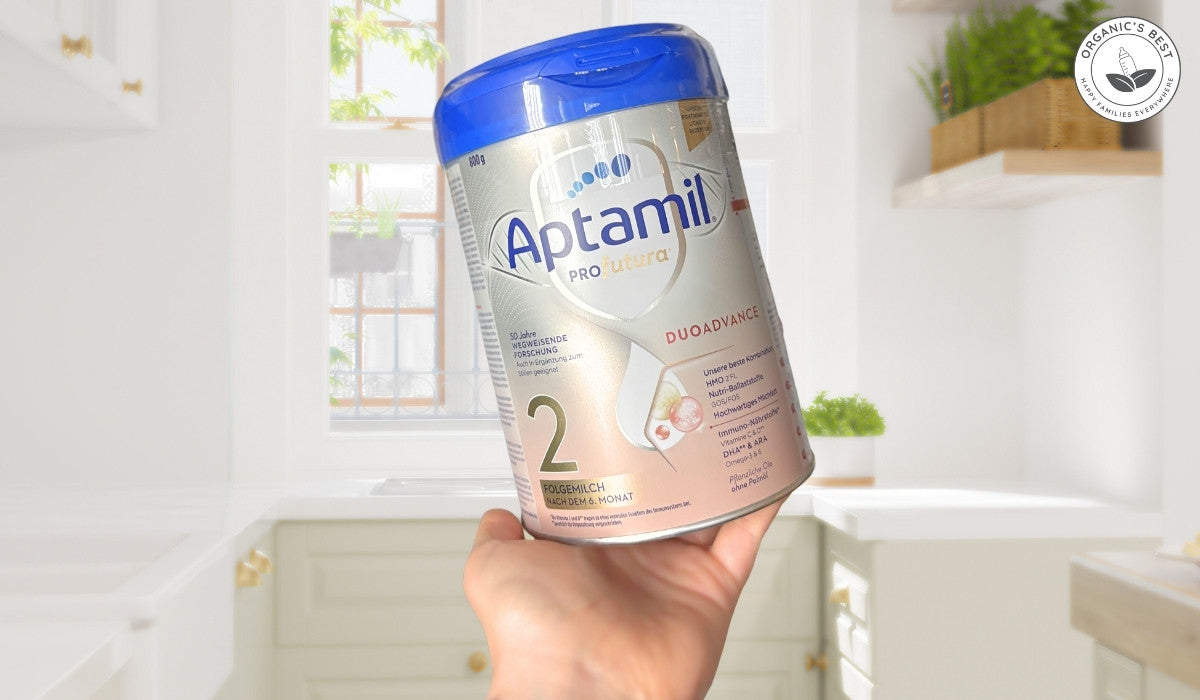Click to Get 2 FREE Boxes/Cans
Only New Customers! Click HERE to Get 2 Extra Boxes/Cans for Free With Your First Order.
BABY FORMULA
Offering new parents top-quality European infant formula from renowned brands like HiPP, Holle, Kendamil, and more. If you’re uncertain about which product to choose, our Formula Finder can help you make the best decision for your baby.
Baby Food
Offering new parents a premium selection of European baby foods, including jars, pouches, cereals, and snacks from esteemed brands like HiPP and Holle.
A Closer Look at Aptamil Formula Highlights
by Agustina Fernandez May 06, 2025 9 min read

With various stages, unfamiliar ingredients, and formulas tailored to different dietary requirements, it's normal to seek reassurance that you're making the right choice when selecting an infant formula for your little one.
While every baby has unique needs, there is one thing that many parents agree on: they want a formula that's gentle, safe, and packed with nutrients, essentially the next closest thing to breast milk. That's where Aptamil baby formula comes in.
In this article, we'll walk you through everything you need to know about Aptamil baby formula: how it works, what makes it so special, and how it can support your baby at every stage of development. Let's take a closer look at why Aptamil formula is a trusted choice for parents navigating the world of formula feeding.
Table of Contents
- Introduction to Aptamil Formula
- How Aptamil Supports Your Baby's Development From Day One
- The Science Behind Aptamil Baby Formula: What Makes It Special?
- Nutritional Advantages of Aptamil Milk
- Understanding the Different Stages of Aptamil Formula
- Aptamil Profutura vs Aptamil Pronutra: What's the Difference?
- Final Touch: Answering Your Questions
Introduction to Aptamil Formula
If you've been wondering what makes Aptamil formula so special, you're in the right place. If you've been on the hunt for baby formula, you might have already heard of it, since Aptamil formula is loved by parents worldwide. It is backed by over 50 years of pioneering research and has collaborated with more than 500 scientists and nutrition experts, making it a global leader in infant nutrition. Notably, it also has the largest breast milk research program in all of Germany.
What truly sets Aptamil baby formula apart is the innovation that goes into perfecting the product. Aptamil formulas are designed to evolve with the latest discoveries in early-life science, bringing bottle-fed babies closer than ever to the nutritional gold standard of breastfeeding. So, what does that mean for your little one?
Aptamil is dedicated to understanding the intricate composition of breast milk, including its vital nutrients, beneficial fats, immune-boosting properties, and its profound effect on the gut microbiome. While nothing can truly replicate the complexity of breast milk, Aptamil formula comes impressively close, thanks to decades of research, development, and breakthroughs in nutrition science.
Aptamil's partnership with Danone's Nutricia group, a global leader in early-life nutrition, allows them to push the boundaries of formula development even further. Every tin of Aptamil formula undergoes rigorous quality checks and is tested by independent laboratories, ensuring that you can feel confident in the safety, consistency, and nutritional quality of each bottle you prepare for your baby.
With patented innovations like the signature Lactofidus® fermentation process, along with carefully selected prebiotics, postbiotics, and human milk oligosaccharides (HMOs), Aptamil creates a formula that doesn't just provide essential nutrients, it also nurtures your baby's immune system and gut health. These advanced ingredients work in harmony to create a balanced formula that supports your baby's development from the inside out.
Whether you're supplementing breastfeeding, transitioning to formula, or feeding exclusively, Aptamil offers formulas that are crafted with your baby's growth in mind. Each stage is thoughtfully designed to provide the right nutrients at the right time, helping your baby thrive at every step of their journey.
Next, we will look at what you'll find in Aptamil formula, and how their special blend works to support infant health from day one.
How Aptamil Supports Your Baby's Development From Day One
There's no such thing as one-size-fits-all when it comes to babies, so Aptamil offers a range of formulas tailored to different stages of development and individual needs.
The good news is that across the board, all Aptamil baby formulas share a common purpose, which is to support your baby's growth in the most natural and nourishing way possible. In this regard, each scoop of Aptamil milk powder contains only high-quality ingredients and is completely free from artificial preservatives and additives.
Here's how each bottle of Aptamil formula supports your baby:

-
Brain and eye development - Aptamil baby formula is thoughtfully made with nutrients that support your baby's rapidly developing brain and eyes, especially during that crucial first year. It includes expert-recommended levels of DHA, an omega-3 fatty acid known for boosting cognitive function and visual development. Alongside DHA from fish oil, every stage of Aptamil also contains ARA (omega-6) and folic acid to help lay the foundation for learning, exploring, and hitting those big developmental milestones.
-
Digestive health - Healthy digestion is a huge part of early development. Aptamil baby milk contains prebiotics (like GOS and FOS) that feed the good bacteria in your baby's gut and postbiotics, which are beneficial byproducts of fermentation that help balance the gut microbiota. This can help reduce tummy discomfort, constipation, and colic. In fact, postbiotics may offer a gentler alternative to probiotics, as research shows that postbiotics can be particularly well suited to babies with weaker immunity because, unlike probiotics, they are non-living bacterial components that provide a higher degree of safety while still delivering gentle immune system support.
-
Immune system support - Aptamil formulas like Pronutra and Profutura are designed to support your baby's immune system from the start. They're enriched with key nutrients like vitamins C and D, which play a vital role in immune function and help build a strong foundation for lifelong health. Select formulas also include HMOs and bifido cultures, proven to support a healthy gut microbiome, which is closely tied to immune strength.
-
Gentle energy source - Aptamil formula contains lactose as the sole carbohydrate source, just like human milk. Lactose provides steady energy, helps avoid blood sugar spikes, and supports the growth of healthy gut bacteria.
The Science Behind Aptamil Baby Formula: What Makes It Special?
There's a lot of science packed into every scoop of Aptamil formula, but we're here to make it simple and parent-friendly, so there's no need to decode the label yourself.
The most important thing to know is that Aptamil's research-driven design is all about mimicking breast milk's benefits as closely as possible, down to its taste, structure, and function. Their formulas are regularly updated based on ongoing clinical studies and advances in neonatal nutrition.
Of all the Aptamil ingredients, here are a few of the most innovative additions to the Aptamil formula recipe that are worth highlighting.

HMOs (Human Milk Oligosaccharides)
Naturally found in breast milk, HMOs are specialized carbohydrates that help shape your baby's gut microbiome and strengthen their immune defenses. They act as prebiotic compounds, feeding beneficial bacteria while also helping prevent harmful bacteria from attaching to the gut lining.
Aptamil baby formula contains structurally identical HMOs to select formulas, in the form of 2'-FL (exclusive to Profutura) or 3'-GL (exclusive to Pronutra), offering protective benefits that closely mirror those of breast milk, helping bridge the gap when breastfeeding isn't an option or needs to be supplemented.
Prebiotics & Postbiotics
Aptamil formula includes a carefully balanced mix of prebiotics, specifically, galacto-oligosaccharides (GOS) and fructo-oligosaccharides (FOS). These prebiotics feed the good bacteria in your baby's gut, encouraging the development of a healthy microbiome right from the start.
As these prebiotics are fermented in the gut, they naturally produce postbiotics, which are beneficial byproducts that help regulate the immune system, reduce inflammation, and support the integrity of the gut barrier. Aptamil goes a step further with its unique Lactofidus® fermentation process, which helps create additional postbiotic compounds and makes the formula easier to digest for sensitive tummies.
Other Smart Additions
-
Nucleotides - Nucleotides are the tiny but mighty building blocks of your baby's DNA and cells. They support rapid cell growth, especially in the immune system and digestive tract, two areas that develop quickly during infancy. By including nucleotides, Aptamil formula helps mimic the immune-boosting benefits of human milk and supports your baby's ability to respond to new environments, germs, and growth demands.
-
LCPs (Long-Chain Polyunsaturated Fatty Acids) - These brain-boosting omega fats are essential in the early years. DHA (an omega-3) supports brain development and visual acuity, while ARA (an omega-6) plays a role in cognitive growth and immune function. Aptamil provides both in balanced, expert-recommended amounts to support learning, memory, and overall neurological development.
-
Anhydrous Milk Fat - Exclusive to the Profutura line, this high-quality milk fat is similar to cream but with its water content removed. It provides energy to babies, supports the absorption of fat-soluble vitamins, and also gives the formula a smooth, pleasant taste.
Nutritional Advantages of Aptamil Milk
When it comes to infant formula, what's not included can be just as important as what is. Aptamil doesn't just add science-backed nutrients, it also leaves out ingredients that don't belong in your baby's bottle.
Here's what makes Aptamil a formula you can feel good about:

-
No added sugar: Aptamil formula gets its natural sweetness from lactose, the primary carbohydrate in breast milk. There are no added sugars, syrups, or unnecessary sweeteners.
-
GMO-free: Strict EU regulations prohibit the use of genetically modified ingredients in infant and follow-on formula. That means Aptamil formula is crafted without GMOs. pure and simple.
-
No artificial preservatives: You won't find synthetic preservatives or additives in Aptamil formula. Aptamil's nutrition is clean, purposeful, and focused on what your baby truly needs.
-
No palm oil: Aptamil formula avoids palm oil, which can be harder for some babies to digest and may impact calcium absorption. Instead, it opts for alternative fat sources like coconut oil, rapeseed oil, soy oil, and sunflower oil.
The nutritional decisions reflect a growing trend among formula manufacturers to align more closely with nature, something Aptamil formula excels at.
Understanding the Different Stages of Aptamil Formula
Babies grow fast, and so do their nutritional needs. Aptamil's stage-based formulas are designed to support your little one through each key phase of early development, from those first sleepy snuggles to wobbly first steps:

Aptamil Stage 1
For newborns, Aptamil First Infant Milk provides complete nutrition that closely mirrors the composition of breast milk. Whether you're exclusively formula feeding or supplementing, Aptamil 1 is ideal for supporting immune health, brain development, and digestive comfort in those early months when your baby is adjusting to the world outside the womb. Aptamil Stage 1 is also naturally gentle on tiny bellies thanks to the lactose-only base.
Aptamil Stage 2
Around 6 months, babies begin exploring solid foods and the world around them. Aptamil Stage 2, otherwise known as Aptamil follow-on milk, is tailored to complement this milestone. Aptamil 2 contains high amounts of iron, calcium, phosphorus, and vitamin D to help fuel growing bodies and developing brains while still being gentle on a maturing digestive system.
Aptamil Stage 3
Designed for infants from 10 months onward, Aptamil 3 bridges the gap between baby formula and toddler nutrition. Depending on the region, Aptamil Stage 3 is labeled as a follow-on or an Aptamil toddler milk. Either way, it's crafted to support your child's evolving needs with nutrients that promote strong bones, a resilient immune system, and healthy cognitive function, perfect for busy babies.
Aptamil Profutura vs Aptamil Pronutra: What's the Difference?
Aptamil offers two expertly crafted formula lines: Pronutra and Profutura. While both versions of Aptamil formula are backed by decades of research and designed to support healthy development, they have some key differences that can help you decide which one fits your family best.

Aptamil Pronutra
Pronutra is Aptamil's trusted original formula range, known for its well-balanced composition and digestive comfort. It uses a lactose-only base (no added starch or maltodextrin) and is designed to be easy on sensitive stomachs, great for babies prone to gas or fussiness.
Here are some of the standout features:
-
3'-GL (a type of HMO) to support gut health and immunity
-
GOS/FOS prebiotic fiber blend to nourish good bacteria
-
Bifido cultures and postbiotics from Aptamil's Lactofidus® fermentation process
-
Simplified feeding experience thanks to EasyPack cans featuring a built-in scoop, click-closure lid, and scoop holder for one-handed prep
-
It comes in 3 stages: Aptamil Pronutra 1, Aptamil Pronutra 2, Aptamil Pronutra 3, catering to different phases of development
Pronutra is ideal for parents looking for a straightforward, gentle formula that covers all the bases without overcomplicating things.
Aptamil Profutura
Profutura is Aptamil's most premium and innovative formula line. It's designed to closely replicate the complexity of breast milk, incorporating the latest in nutritional science to support long-term health and development.
Here is how it differs from the Pronutura line:
-
Contains 2'-FL HMO, a structurally identical compound to one found in human milk
-
Includes anhydrous milk fat, a rich, high-quality fat source that supports vitamin absorption and provides a creamy texture babies love
-
It comes in 2 stages: Aptamil Profutura 1, Aptamil Profutura 2, catering to different phases of development
Ultimately, both versions of Aptamil baby formula support healthy growth, but Profutura is more science-forward and ideal if you're looking for the latest in formula advancements. Pronutra offers excellent value with a more classic formulation that's easy to find and easy on the tummy.
Final Touch: Answering Your Questions
Now that we have given you the rundown on Aptamil, here's a quick recap featuring some of the most asked questions.
Is Aptamil Formula Organic?
Aptamil formula is not certified organic. However, Aptamil infant formula follows strict European Union standards for infant formula production, meaning their formulas are free from GMOs and unnecessary additives. If organic certification is a dealbreaker for you, you might want to look into other organic formulas like Holle or HiPP.
Is Aptamil Suitable for Newborns?
Absolutely! Stage 1 is an Aptamil newborn milk, specifically formulated from birth onward. It can be used as a breast milk substitute or for combination feeding. It's gentle, nutritionally complete, and well-tolerated by most babies.
Is Aptamil Safe for Babies with Sensitive Stomachs?
Aptamil formula milk is carefully designed with sensitive stomachs in mind. Its gentle lactose base, along with gut-supporting prebiotics and postbiotics, makes it easy on little tummies. However, it's always best to consult your pediatrician if your child has special feeding needs.
|
Disclaimer: Please be aware that this information is based on general trends in babies, and it is not medical advice. Your doctor should be your first source of information and advice when considering any changes to your child’s formula and when choosing your child’s formula. Always consult your pediatrician before making any decisions about your child’s diet or if you notice any changes in your child. Breastfeeding is the best nutrition for your baby because breast milk provides your child with all the essential nutrients they need for growth and development. Please consult your pediatrician if your child requires supplemental feeding. |
Agustina Fernandez
Dr. Agustina Fernandez earned her medical degree from the prestigious Universidad Nacional de Córdoba, Argentina. With a deep-rooted passion for pediatrics, Dr. Fernandez is currently on the path to specializing in children's healthcare. Recently, she has delved into the vital field of infant nutrition. Her research interests include breastfeeding, infant formula, and baby food in little ones’ formative years. Dr. Fernandez's commitment to this area of study underscores her dedication to ensuring the health and well-being of children from their earliest days.
Leave a comment
Comments will be approved before showing up.
Also in Organic Infant Nutrition and Health Blog

Spilled Milk: Feeding Unfiltered with Hayley
by Agustina Fernandez February 04, 2026 4 min read
Read More
Baby Bath Guide: How to Bathe a Newborn
by Agustina Fernandez February 03, 2026 8 min read
Read More
Does Your Kid Need More Vitamin D in Winter?
by Agustina Fernandez January 28, 2026 7 min read
Read More
Reviewed by Dr. Bardha Qerimi, MD
-

Dr. Bardha Qerimi: Medical Reviewer of Organic's Best Blog
Dr. Bardha Qerimi completed her medical studies at the University of Prishtina in Kosovo, where she began her journey into the field of medicine. She has since developed a career in medical research, contributing to projects with notable organizations, including the World Health Organization (WHO).
